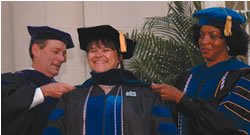
2003 graduation facts
School of Medicine
Rollins School of Public Health
Nell Hodgson Woodruff
School of Nursing


Interim Provost Woody Hunter and nursing Professor Ora Strickland hood the Nell Hodgson Woodruff School of Nursing's first PHD candidate, Carolyn Constantin.

By Pam Auchmutey
Conventional wisdom says that the immune system is suppressed during
pregnancy.
Maybe not, says Carolyn Constantin, who made Emory history this spring as the first person to earn a PhD through the new doctoral program in the Nell Hodgson Woodruff School of Nursing. Through her research, she found no substantial differences in how the immune systems of pregnant and nonpregnant mice responded to the same virus.
Although caution is always warranted when attempting to transfer discoveries in animals to clinical situations in humans, her findings eventually could improve health outcomes for expectant mothers and other patients. "Understanding the changes in innate and adaptive immunity during pregnancy could lead to preventive measures for infections, infertility, and other reproductive problems," Constantin says. "Understanding the interactions between mother and fetus and the mechanisms that protect the fetus from rejection by the mother also may lead to interventions that improve fertility, transplantation technology, and cancer therapies."
Constantin's interest in pregnancy and science is no surprise. She is a women's health nurse practitioner, has 14 years of clinical experience as a labor and delivery nurse, and taught maternal and child health at Boston College for seven years before pursuing her PhD. Determined to learn more about genetics and bench science, she enrolled in Emory's doctoral program for nurses in 1999, the year it was established.
Addressing Constantin as "Dr." is a milestone for her and the School of Nursing. The doctoral program is the culmination of a strategic goal to prepare strong research scholars who are also strong leaders in health care. It also is a natural extension of the school's efforts to become one of the nation's top-tier nursing schools. Currently, 14 students are enrolled in the program, and five more are expected to join them this fall.
Constantin is among a new cadre of nurse researchers who are integrating knowledge from the basic sciences into the study of health problems -- from the nursing perspective. She also joins only a handful of PhDs in the nation with a focus on immunology, an interest that developed from her nursing clinical experience and concern about the impact of infections, particularly viral infections, on the health of the pregnant woman and her fetus.
The doctoral program has been nothing short of enriching for Constantin. "I fell into a pot of gold," says Constantin of her collaborators, gynecologist Elizabeth Bonney (now at the University of Vermont); Rafi Ahmed, director of the Emory Vaccine Center; and John Altman, a pioneer in cell immunology.
She set up a mouse maternity ward in Ahmed's lab. As her research progressed, Altman guided her in using flow cytometry to analyze the number and function of T cells (the memory cells that provide protective immunity in the body) generated in pregnant and nonpregnant mice infected with the same virus.
She is quick to point out she could not have come so far on her own.
"Many people have guided me on this adventure," says Constantin.  "I also want to thank the mice, who through no will of their own,
have contributed a lot to my research and my career."
"I also want to thank the mice, who through no will of their own,
have contributed a lot to my research and my career."
Kudos and more


The world's largest tuned wind chime is the latest in a long line of gifts from the Emory Crawford Long Hospital Auxiliary. Over the past decade, the auxiliary has donated more than $1.5 million to boost projects in Women's Health Services, the surgical suites, the medical library, neonatal intensive care, the Peachtree lobby, and the employee lounge.
SARAH BERGA is the new chair and James Robert McCord Professor of the Department of Gynecology and Obstetrics.
Neurologist TIMOTHY GREENAMYRE chairs the advisory board of LEAPS (Linked Efforts to Accelerate Parkinson's Solutions), which will award up to four multimillion dollar grants this year to interdisciplinary research teams.
ROBERT HARRIS, the new chief of orthopaedic surgery/trauma at Grady, hopes to attract more patients with complex injuries from throughout the state.
The Association of Black Cardiologists honored the School of Medicine and cardiologist DAVID HARRISON for Emory's continued commitment to training minority cardiologists. Emory's cardiology program has graduated about 20 African-American heart specialists, while nearly half of US cardiology training programs have yet to graduate one African-American.
In the Atlanta Business Chronicle's Health Care Heroes
Awards competition, JOHN HENRY, CEO of Emory
Hospitals, received the Lifetime Achievement Award. Vaccine researcher
HARRIET ROBINSON won in the health care innovations
category for developing an AIDS vaccine candidate, along with colleagues
at Emory and the NIH, and for successfully testing the vaccine in rhesus
macaque monkeys at Yerkes.
Faculty finalists included neurologist JERROLD
VITEK for developing groundbreaking therapies for neurological
disorders including Parkinson's disease and dystonia; transplant surgeons
and immunologists CHRIS LARSEN and TOM PEARSON
for successfully conducting the first islet cell transplant in Georgia
to treat type I diabetes and for their ongoing innovative research toward
achieving true immune tolerance in organ and tissue transplants; endocrinologist
JAMES ECKMAN and ALAN PLATT of the Georgia Comprehensive Sickle Cell Center
at Grady for developing technology to document pain levels; LINDA SPENCER, director of the Public Health Nursing
Leadership Program, for 22 years of work to improve nursing and health
care in underdeveloped countries; and psychologist NADINE KASLOW for her efforts to help abused women and
their children.
JEFFREY KOPLAN, VP for academic health affairs, and JOHN STONE, professor emeritus, are two of only 38 US physicians to receive a mastership, the American College of Physicians' highest honor.
Biotech expert LARRY MCINTIRE now chairs the Wallace H. Coulter Department of Biomedical Engineering, a joint department of Georgia Tech and Emory.
ROBERTO PACIFICI, the new director of endocrinology and metabolism in the School of Medicine, plans to develop a state-of-the-art center for osteoporosis research and treatment as well as a comprehensive education program for patients with diabetes.
— In memory —

In this issue
From the CEO / LettersPromises writ in stone
Taking care of people
Taming the obNOXious enzyme
Moving forward
Noteworthy
On Point:
Communicating medical errors
George Brumley greatly expanded pediatrics at Emory when he was chair and influenced many of the faculty here now. "As a young physician, I was inspired by Dr. Brumley's commitment to the care of children, the significance of new and cutting-edge research, and the importance of child advocacy in the wider political and community arena," says Barbara Stoll, interim chair of pediatrics. "He was a very special man of quiet humility who lived and taught the responsibility to give back to the community." Brumley also was the medical school's interim dean and executive associate dean for clinical affairs, as well as medical director of what is now Children's Healthcare of Atlanta at Egleston and chief of pediatrics at Grady. He died July 20 with eleven family members in a small plane crash in Kenya.
Many of those family members who perished also had close ties to Emory. His wife, Jean Brumley, received the Emory Women's Club Achievement Award. Daughter Lois Brumley Morrell, a graduate of the School of Nursing, was a former neonatal nurse practitioner at Emory Crawford Long Hospital and Children's. Her husband, Richard Morrell, had completed his psychology predoctoral internship at Grady and planned to begin psychology postdoctoral fellowship training in the Emory School of Medicine at Children's. Daughter Beth Brumley Love earned a PhD in psychology from Emory, and son George Brumley III was an Emory college graduate.
Copyright © Emory University, 2003. All Rights Reserved.
Send comments to the Editors.
Web version by Jaime Henriquez.